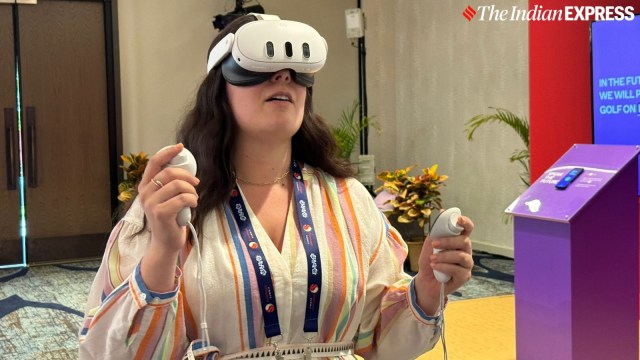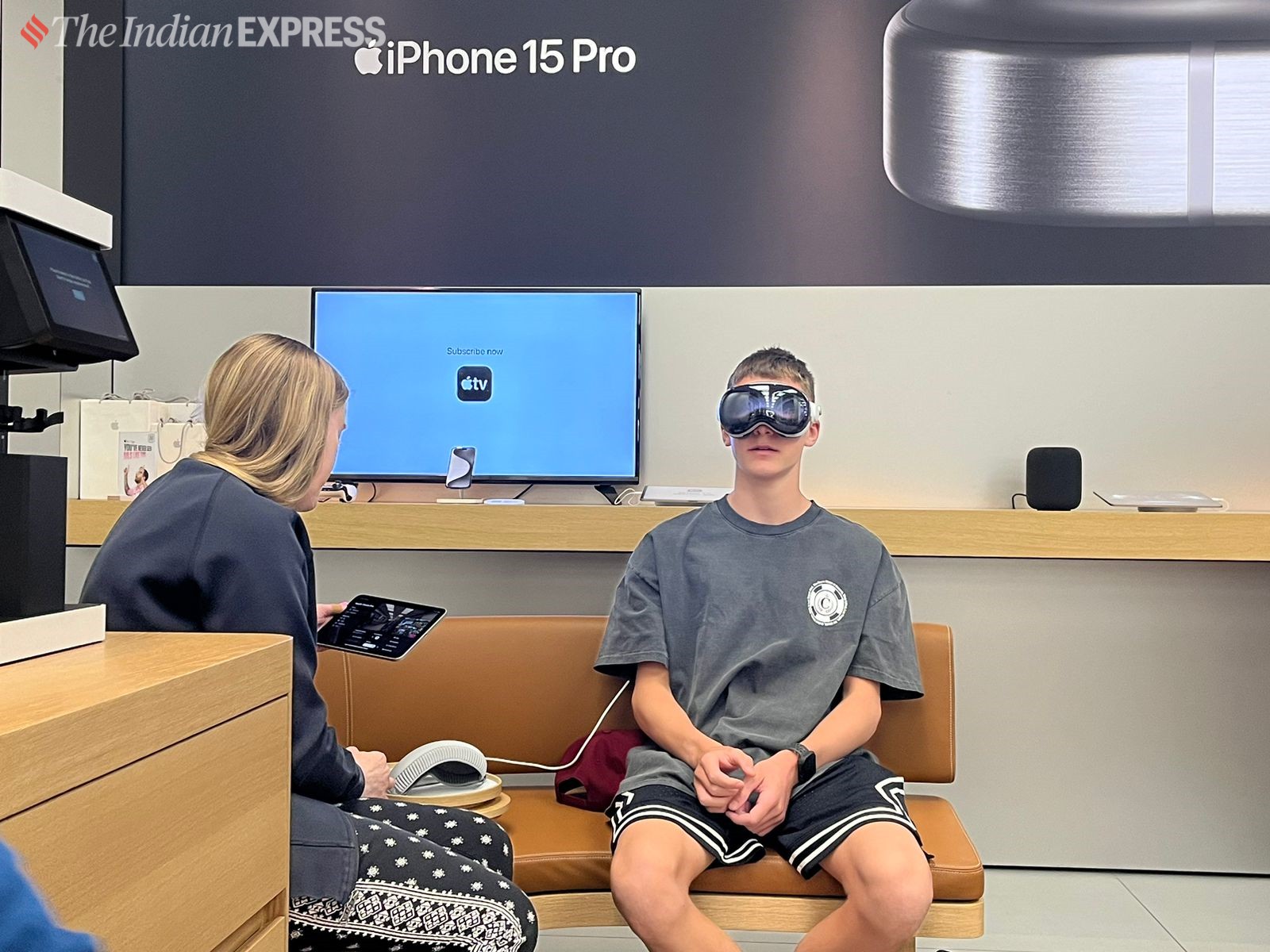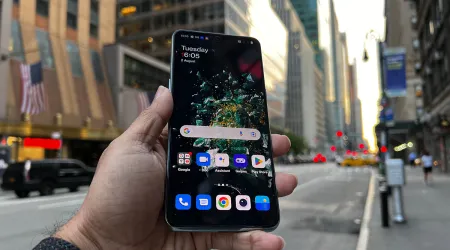- India
- International
Why is Meta opening up the Quest headset’s Horizon OS to third-party hardware makers
Meta’s decision to license the operating system for its Quest headsets to other hardware makers will give consumers more choice to buy headsets with the Horizon OS and also help diversify business.
 Meta’s Quest 3 blends virtual reality and mixed reality. (Image: Anuj Bhatia/The Indian Express)
Meta’s Quest 3 blends virtual reality and mixed reality. (Image: Anuj Bhatia/The Indian Express)
There is a good chance your first mixed-reality headset will be running Meta’s Horizon operating system, and the choices to buy different types of headsets would be as diversified as Windows-powered PCs and Android smartphones. This may become a reality a few years from now as Mark Zuckerberg’s Meta has announced that it is taking the route of licensing the operating system for its Quest headsets to other hardware makers, such as Lenovo and Asus. That means, just like how users buy a Windows PC or Android smartphone today, Meta’s hardware partners will sell headsets powered by the same operating system as the company’s first-party Quest-branded headsets.
 Meta wants Horizon OS to become the “Android of headsets,” enabling an open ecosystem of VR/MR devices running its software. (Image: Meta)
Meta wants Horizon OS to become the “Android of headsets,” enabling an open ecosystem of VR/MR devices running its software. (Image: Meta)
This is a classic example of taking a page from Microsoft and Google, both of which work closely with multiple hardware makers. As a result, people began buying PCs and smartphones in large numbers. However, Meta’s strategy mirrors Google’s Android (more than Microsoft, which charges upfront fees from hardware makers to license Windows) in creating an open-source VR operating system designed for third-party headsets.
Meta’s rejuvenated approach once again brings back the age-old debate between open and closed models, hitting at Apple, which favours a closed approach to building products and has succeeded in it.
Opening Horizon OS is good for business
For years, Meta has tried to create chatter with the Metaverse, a word best described as a fully digitized world that exists beyond social media, and pumped billions of dollars to create an ecosystem around the hardware and software. However, Meta’s push to develop virtual reality and augmented reality technology has been bumpy despite its lead in designing cutting-edge hardware as well as the operating system that runs on the devices. But Meta has a plan to “mainstream” VR goggles similar to how Microsoft and Google made PCs and smartphones beyond the enthusiast market. Shipping Meta Horizon OS, the operating system that powers its Quest headsets, and licensing it to third-party hardware makers which will develop new devices powering the Horizon OS could widen the availability of headsets well beyond the Quest 2, Quest 3, and Quest Pro.
Meta did not offer details on the new headsets from Lenovo and Asus nor did it share business terms of how the licensing works. However, the strategy is good for business. Not only does it give consumers more choice to buy headsets with the Horizon OS, but it also helps diversify the business, bringing more cash to Meta’s Reality Labs division. In the fourth quarter of 2023, Meta reported a loss of $4.65 billion in the division.

 Meta says that Horizon OS is the result of a “decade of work” to build a next-gen computing platform. (Image: Meta)
Meta says that Horizon OS is the result of a “decade of work” to build a next-gen computing platform. (Image: Meta)
Going the Google way
Perhaps the biggest change is the ideological shift from just being a hardware maker to becoming more of a software player, mimicking Google, which calls itself a champion of open-source software and open systems. Zuckerberg has repeatedly said he wants Meta to be an open platform. With the Horizon OS and Horizon Store, Meta wants to be the Android operating system for headsets. A decade ago, Google successfully cracked this formula with its Android operating system, unlike Apple’s iOS or Microsoft’s Windows, which is indeed open source. That has resulted in the plan that made smartphones accessible to billions of people (Google practically gives away Android for free to OEMs), as well as led to the creation of a mobile ecosystem which includes handset makers, developers, and chip companies. However, the secret sauce to the success of Google was its sprinkled services and its expertise in search advertising technology.
The significance of Meta’s new strategy is not the hardware, but rather the open-source model and Google’s direct sales model. Meta could be following in the footsteps of Google, firmly aiming to bolster the software to dominate the VR and mixed-reality market. If more users buy headsets powered by Meta’s Horizon operating system, the company could make annual software updates that entice users to buy new devices, similar to how Google releases a new version of Android for smartphones every year. Eventually, the larger goal is to bring advertising on top of the software. Meta is, in a true sense, an advertising company. But for that, it needs the support of developers to create new types of experiences and bring apps to the Horizon Store. Meta said it is developing a special “spatial app framework” designed for mobile developers to port their apps to Horizon OS headsets. The App Store is still critical for the success of new-age headsets as it was in the time of mobile, which made Apple and Google the tech juggernauts they are today.
View this post on Instagram
Meta has big ambitions as to how it wants to position the Horizon operating system on the headsets. In fact, it is even inviting Google to bring its Play Store to its operating system. Meta even wants Steam and Microsoft’s Xbox Cloud gaming to run on its Horizon operating system. This shows that Meta is ready to work with partners – and even rivals – in extending the reach of the company’s Horizon operating system.
The Apple threat
In reality, however, the openness serves two purposes. First, the world will continue to talk about Meta’s Metaverse, if all goes as planned, and secondly, the openness debate puts Meta in a different light from Apple.
“In every era of computing, there are always open and closed models,” Zuckerberg said in a video announcing the news. “With phones, Apple’s closed model basically won out. Phones are tightly controlled, and you’re locked into what they’ll let you do. But it doesn’t have to be this way.”
Apple may have won the smartphone battle, but Zuckerberg doesn’t want Cupertino to win this time – with headsets. Although the Vision Pro costs $3500 and doesn’t directly compete with Meta’s $500 Quest 3, it would still be a headache for Zuckerberg if Apple’s headset fails. Meta is well aware that if the Vision Pro becomes the next form of personal computing, it will be a serious problem. Clearly, Zuckerberg doesn’t want to repeat the same mistakes as Microsoft did and let Google create the “standard non-Apple phone platform” back in the day.
However, Meta is already aware that its strategy may backfire with a Vision Pro competitor launched in the high-end market. Instead, Meta seems to have conceded to the software, and perhaps the lower entry price of hardware, as a way to tackle Apple. That is why Meta is encouraging others to use its Horizon operating system and build the hardware around it.
User accessibility of a mixed-reality headset is still an issue
 Apple’s $3500 Vision Pro headset has a long way to go to solve how users interact with virtual and real environments. (Image: Anuj Bhatia/The Indian Express)
Apple’s $3500 Vision Pro headset has a long way to go to solve how users interact with virtual and real environments. (Image: Anuj Bhatia/The Indian Express)
Meta’s opening of the Quest headset’s operating system to others and creating an iPhone vs. Android dynamic with headsets do not immediately solve pertinent issues users have had with VR/mixed-reality devices for a long. Even Apple’s $3500 Vision Pro headset has a long way to go to solve how users interact with virtual and real environments – and if this is the spatial computing platform that might eventually replace our smartphones. So, the question really is not if the metaverse will make a comeback in the age of artificial intelligence in 2024. The bigger question to ask is whether wearing a headset might change our lives and successfully help us navigate the technology transition from phones to face computers. Not surprisingly we are not close to scenarios where users could remotely work on a project with the feeling as if they were in the same room. Maybe in the future, but not at present.
More Tech
May 03: Latest News
- 01
- 02
- 03
- 04
- 05






























